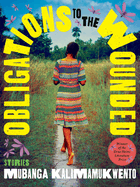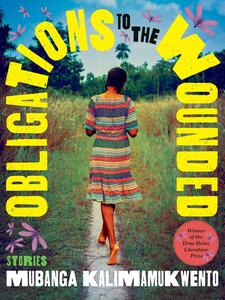
 Zambian author Mubanga Kalimamukwento's Obligations of the Wounded contains 16 stories, all but one spotlighting the lives of Zambian women in and out of their native country: they're victims and survivors, resigned and ferocious, trapped and free. Obligations won the 2024 Drue Heinz Literature Prize, which has honored writers of short fiction since 1981, chosen by Angie Cruz (Dominicana), who deemed Kalimamukwento's work "a graceful, touching, and generous collection."
Zambian author Mubanga Kalimamukwento's Obligations of the Wounded contains 16 stories, all but one spotlighting the lives of Zambian women in and out of their native country: they're victims and survivors, resigned and ferocious, trapped and free. Obligations won the 2024 Drue Heinz Literature Prize, which has honored writers of short fiction since 1981, chosen by Angie Cruz (Dominicana), who deemed Kalimamukwento's work "a graceful, touching, and generous collection."
The wounds of familial relationships loom throughout. Two sisters populate "Azubah," in which the older sister stayed in Zambia while the younger immigrated to the U.S.; she is now called home because "Mama is really bad"--shattering confrontations are inevitable. In "A Doctor, a Lawyer, an Engineer, or a Shame to the Family," a new aunt writes a five-part "cheat sheet for how to not disappoint your Zambian parents" for her infant niece, which already demands the impossible: "Be born first (and male) AND MALE." A woman concurrently becomes a mother and loses her own mother in "Mastitis," but her dead mother proves more nurturing and helpful than her detached husband. In "It Will Be Beautiful Again," a dying mother wonders "How do you cram a lifetime of lessons into one moment?" as she holds her 10-year-old daughter.
Young girls face fearful futures in "Inswa," about a 13-year-old who is married off to the old, already-many-times-married village chief, seemingly in retaliation for discovering her sexuality with her best friend; in "Chess Pie," about a young schoolgirl learning too soon to be silent; and in "Chidunune," about a small child kidnapped while playing hide-and-seek. But women impressively rebel in "Whisper Down the Lane," when students return their teacher's zealous abuse; and in "#BaileyLies," in which a struggling journalist publicly exposes a foreign humanitarian's mendacious memoir. The final, most poignant story, "Where Is Jane?," features a young girl watching other children play a chanting game in which the lines mirror how her mother torments her in increasingly horrifying ways.
In a few stories, Kalimamukwento strikingly experiments with form--visual layout, inventive punctuation, extended white spaces--emphasizing a sense of elliptical not-knowing. Crossed-out text cleverly reveals the unfiltered, honest conversations social norms won't allow. For the dispossessed and discarded--too many of them "wounded" women--independence and agency are hard-won victories. Kalimamukwento, a Zambian Fulbright scholar with a U.S. law degree, writes with empathic knowing, deftly treading between resignation and hope. Her enigmatic storytelling underscores that silence is not an option, that bearing witness is obligatory. --Terry Hong
Shelf Talker: Mubanga Kalimamukwento's superb 16-story collection, Obligations to the Wounded, illuminates the complicated experiences of Zambian women on both sides of the globe.

